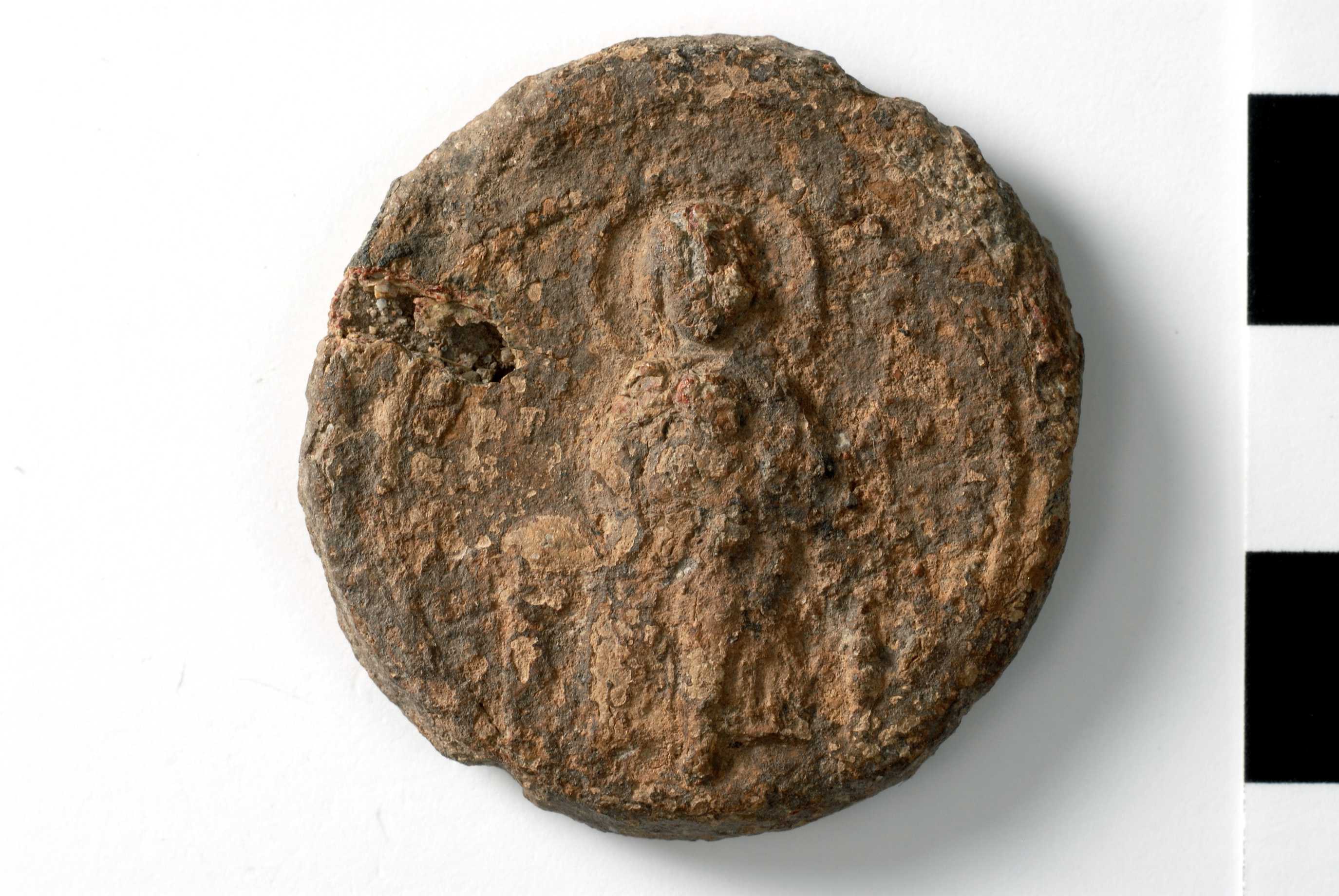John VIII Xiphilinos, Patriarch of Constantinople (1064–75)
Obverse
The Mother of God seated on a backless throne, holding Christ on her knees. At left and right, sigla: M-P-ΘV : Μή(τη)ρ Θ(εο)ῦ. Faint remains of a circular inscription (likely an invocation). Border of dots.
ΘΚΕ.....ΤΩΣΩΔΟΥΛΩ
Θ(εοτό)κε β[οήθει] τῷ σῷ δούλῳ
Obverse
The Mother of God seated on a backless throne, holding Christ on her knees. At left and right, sigla: M-P-ΘV : Μή(τη)ρ Θ(εο)ῦ. Faint remains of a circular inscription (likely an invocation). Border of dots.
ΘΚΕ.....ΤΩΣΩΔΟΥΛΩ
Θ(εοτό)κε β[οήθει] τῷ σῷ δούλῳ
Reverse
Inscription of six lines followed by decoration. Border of dots
ΙΩΑ Ρ
ΕΠΙΣΚΟΠΟ
ΚΝΠΟΝΕΑΣ
ΡΜΗΣΚΑΙΟΙ
ΚΜΕΝΙΚΩ
ΠΡΙΑΡΧΗ
Ἰω(άννῃ) ἀρχ(ι)επισκόπο Κων(σταντινου)πό(λεως) Νέας Ῥώμης καὶ οἰκουμενικῷ π(ατ)ριάρχῃ.
| Accession number | BZS.1951.31.5.253 |
|---|---|
| Diameter | 34.0 mm; field: 27.0 mm |
| Previous Editions | DO Seals 6, no. 118.1a. |
| Credit Line | Harvard Art Museums/Arthur M. Sackler Museum, Bequest of Thomas Whittemore. |
Translation
Θεοτόκε βοήθει τῷ σῷ δούλῳ Ἰωάννῃ ἀρχιεπισκόπο Κωνσταντινουπόλεως Νέας Ῥώμης καὶ οἰκουμενικῷ πατριάρχῃ.
Mother of God, help your servant John, archbishop of Constantinople, the New Rome, and ecumenical Patriarch.
Bibliography
- Catalogue of Byzantine Seals at Dumbarton Oaks and in the Fogg Museum of Art, Vol. 6, Emperors, Patriarchs of Constantinople, Addenda (Open in Zotero)
- Oxford Dictionary of Byzantium (Open in Zotero)
- Un décret synodal inédit du patriarche Jean VIII Xiphilin (Open in Zotero)
- La géographie ecclésiastique de l’empire byzantin, Vol. 1, Le siège de Constantinople et le patriarcat oecuménique, Pt. 3, Les églises et les monastères (Open in Zotero)

Commentary
John Xiphilinos was born in Trebizond about 1010. He pursued studies in Constantinople and eventually became nomophylax of the law school there (ODB 2:1054). Later he became a monk and was eventually selected by Emperor Constantine X (1059–67) to succeed Constantine Leichoudes. In 1072 John presided over an assembly of metropolitans and archbishops at the oratory of St. Alexios in which the question of the election of bishops to vacant sees was discussed. Michael Keroularios had forbidden metropolitans who were resident in Constantinople from participating in such elections. John, however, recognized that metropolitans sometimes had to remain for a long period in the capital due to ecclesiastical business or illness. The assembly with John’s consent decreed that metropolitans who gave the patriarch advance notification of their intent could again vote while resident in Constantinople (See Oikonomides, “Décret synodal,” 56). After his death his remains were buried at the monastery of Angourion on 2 August 1075 (Janin, Grands centres, 27).